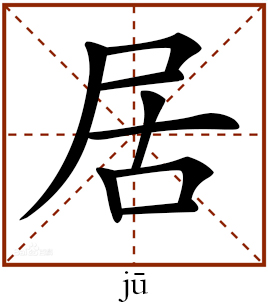Live

This Chinese character means “to live.” Sometimes it means “to stay” or “in the position of.”
居安思危
jū ān sī wēi
An means safety while wei means danger. Si means “to consider” or “to think of.” This classical allusion teaches people to be prepared for danger in times of peace.
One phenomenon that best explains this term is the boiling frog effect—if put into boiling water, the frog will jump out of the water right away; but if immersed into warm water that gradually heats, it does not jump out of the water immediately, even if it feels the increasing temperature. It is boiled to death before it decides to get out.
A sense of crisis decides whether the frog can survive, and it is the same with human beings. People could compromise to the changes they would prefer to avoid. But the fact that people are not talking about a problem does not mean it is not serious.
Many people are easily content with the status quo and take things as they are. However, being satisfied with a comfortable zone might make them fail to notice a creeping change of circumstances. When crisis comes, one can only wait for doom like a boiling frog.
As early as in the pre-Qin period, the Chinese classic A Commentary on the Spring and Autumn Annals pointed out that “for political governance, it is important to be alert against potential danger in times of peace and safety.” The great master of philosophy Mengzi also said that “One prospers in worries and hardships and perishes in ease and comfort.” Indeed, without an acute sense of danger, it is difficult to accomplish anything.
Emperor Taizong of the Tang Dynasty (618-907) was well aware of this principle. He said to his ministers that “governing the country is like treating a disease. Even if the disease is cured, recuperation and nursing after the sickness is needed. If self-indulgence soon follows, once the old disease recurs, there is no cure.”
Bill Gates once said: “Bankruptcy is only 18 months away from Microsoft.” This is how he motivates his staff to constantly make breakthroughs and strive for innovations. With this sense of crisis, enterprises can avoid losing their way in strategic planning and future development.
edited by BAI LE
